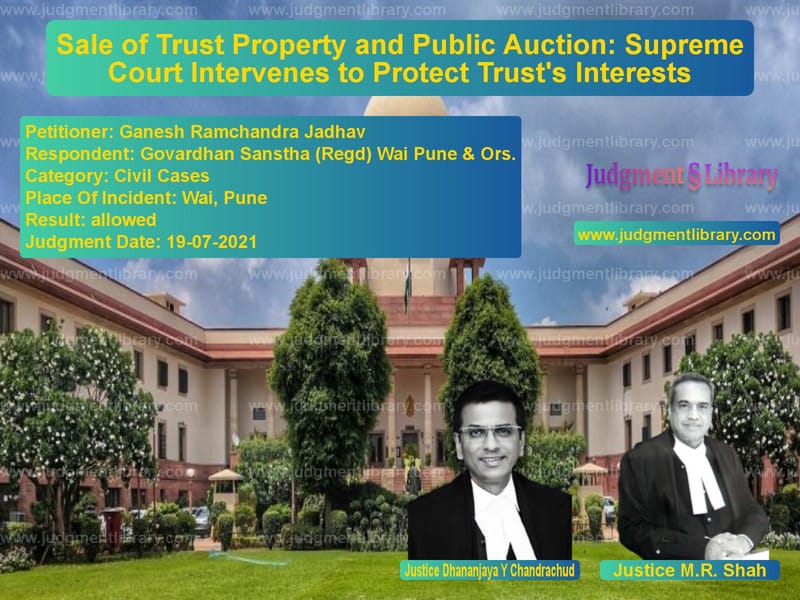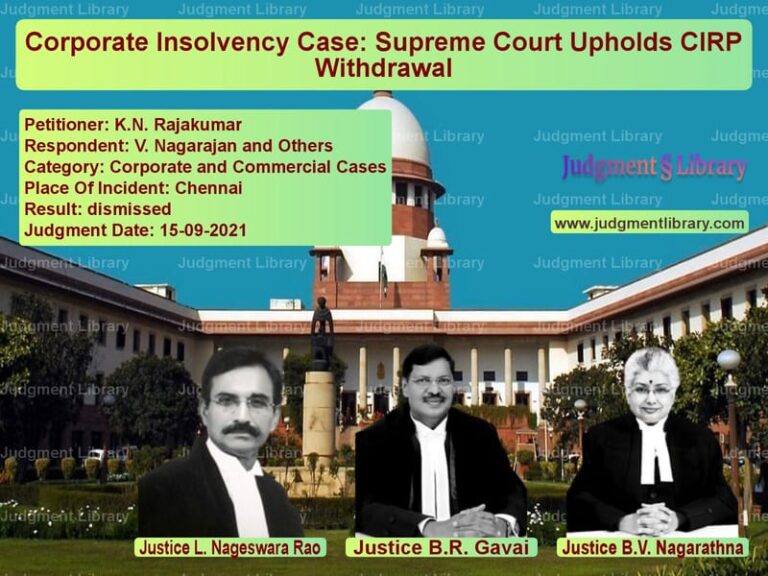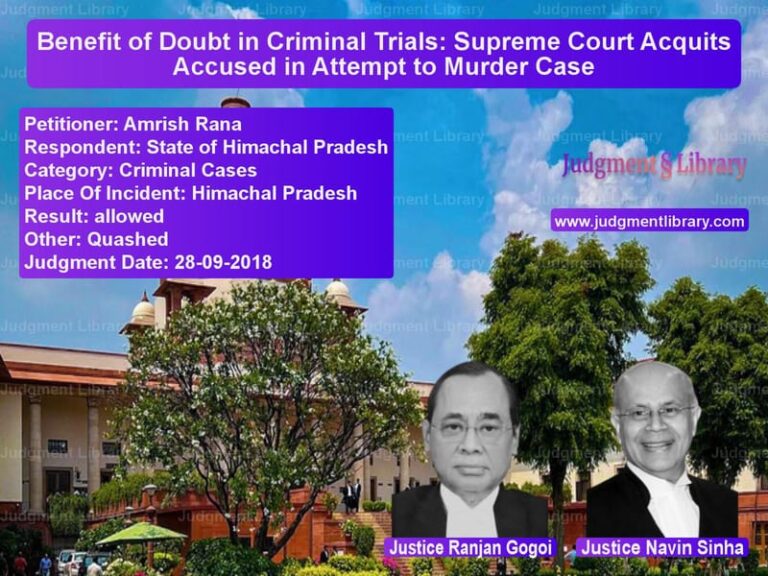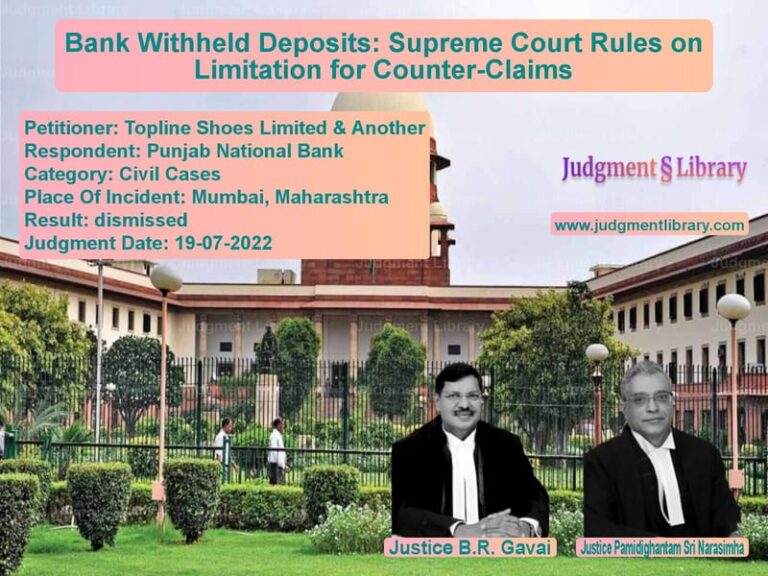Sale of Trust Property and Public Auction: Supreme Court Intervenes to Protect Trust’s Interests
The Supreme Court of India, in its judgment dated 19th July 2021 in the case of Ganesh Ramchandra Jadhav v. Govardhan Sanstha (Regd) Wai Pune & Ors., addressed the issue of the sale of property belonging to a public charitable trust and the importance of conducting such transactions through public auction. The case highlights the Court’s role in ensuring that the sale of trust property is conducted transparently and in the best interest of the trust, preventing potential fraud or collusion.
The dispute arose from the sale of a 2.48-hectare property owned by the Govardhan Sanstha, a registered charitable trust. The property was initially put up for sale by the trust, and after multiple rounds of bidding, the appellant, Ganesh Ramchandra Jadhav, alleged that there had been collusion in the bidding process. The Court ultimately directed a fresh round of bidding, ensuring a fair process for the sale of the trust’s land.
Background of the Case
The property in question, located in Survey No. 90, Hisra No. 6, at Village Dabewadi, Taluka and District Satara, was owned by the Govardhan Sanstha. The trust had decided to sell the land and published a tender inviting bids from interested buyers. Two bids were received: one from the appellant, Ganesh Ramchandra Jadhav, and the other from the second respondent.
Read also: https://judgmentlibrary.com/ex-parte-decree-and-guardian-appointment-supreme-courts-landmark-ruling/
On 6th November 2015, the trust accepted the second respondent’s bid of Rs 32 lakhs, along with a commitment to provide 6000 sq. ft. of constructed area in the property. However, the appellant contended that this bid was unreasonably low and alleged that the second respondent had been favored due to collusion.
The appellant further claimed that the Charity Commissioner had not approved the sale under Section 36(1) of the Maharashtra Public Trust Act, 1950, and that the transaction lacked transparency. A valuation report by the Assistant Charity Commissioner had valued the land at Rs 5 crores, raising doubts about the fairness of the sale price.
The matter escalated when the appellant filed a writ petition before the Bombay High Court, challenging the approval of the sale and alleging collusion between the respondents. The Court, on 21st June 2018, directed the Charity Commissioner to review the sale process.
Legal Issues Before the Court
- Whether the sale of the trust’s property was conducted transparently and in compliance with the applicable legal framework.
- Whether the bids received for the property reflected its true market value.
- Whether the appellant’s offer was disregarded unfairly and whether there was collusion between the respondents.
- Whether the sale should be re-conducted through a public auction to ensure transparency and fairness.
Arguments by the Appellant
The appellant, represented by Dilip Annasaheb Taur, contended:
- The bid submitted by the second respondent was too low and did not reflect the true value of the property.
- There were indications of collusion between the trust and the second respondent to facilitate an underpriced sale.
- The valuation report provided by the Assistant Charity Commissioner had valued the land at Rs 5 crores, making the accepted bid of Rs 32 lakhs unreasonable.
- Despite his own offer of Rs 75 lakhs for the property, the second respondent increased the bid to match it only after the appellant raised concerns, which indicated that the second respondent’s bid was not in good faith.
Arguments by the Respondents
The second respondent, represented by Vikas Mishra, countered:
- The sale of the property was conducted according to the applicable procedures, and the bid was accepted after due consideration by the trust.
- The second respondent’s offer was consistent with the market conditions at the time of the sale.
- The appellant had failed to provide the necessary documentation to support his bid and did not honor his commitment to deposit Rs 75 lakhs, which had been demanded by the High Court.
- The appellant’s claims of collusion were baseless and unsupported by evidence.
Supreme Court’s Observations
The Supreme Court made several important observations in its judgment:
- Public Interest in Trust Property: The Court emphasized that property belonging to a public charitable trust must be sold transparently and in the best interests of the public and the trust.
- Collusion and Fairness: The Court noted that there was a reasonable suspicion of collusion between the respondents, given the substantial increase in the second respondent’s bid after the appellant raised his offer.
- Need for Fresh Valuation: The Court directed that a fresh valuation be conducted for the property to ensure that the trust received a fair price.
- Public Auction: The Court concluded that the sale should be conducted through a public auction to avoid any further suspicion of collusion and to ensure that the trust received the maximum possible value for its property.
Final Verdict
The Supreme Court set aside the High Court’s order and issued the following directions:
- A fresh valuation of the property must be conducted, with the upset price set at no less than Rs 1 crore, based on the new valuation.
- A public auction must be held, with advertisements published in local newspapers, inviting bids from interested parties.
- Both the appellant and the second respondent are permitted to submit their bids, which will be considered along with all other offers received.
- The third respondent, the Charity Commissioner, must submit a report to the High Court regarding the auction process and the bids received.
- The High Court is required to review the report and pass appropriate orders regarding the sale.
- The amount of Rs 1 crore deposited by the appellant with the Bombay High Court is to be held in a fixed deposit during the pendency of the proceedings and may be adjusted towards the appellant’s bid if he participates in the auction.
Impact of the Judgment
This judgment has several key implications for the sale of charitable trust properties:
- Ensures Transparency in Trust Property Sales: The Court’s ruling ensures that public charitable trust properties are sold in a transparent and fair manner, avoiding any suspicion of collusion or underpricing.
- Upholds Public Interest: The decision reinforces the principle that the interests of the public and the trust must be protected, particularly when selling valuable assets.
- Encourages Public Auctions: By ordering a public auction, the Court ensured that the property was sold to the highest bidder, maximizing the value received by the trust.
- Clarifies Legal Standards: The judgment clarified the legal standards for selling trust property, ensuring that similar cases in the future are handled with greater clarity and consistency.
Conclusion
The Supreme Court’s decision in Ganesh Ramchandra Jadhav v. Govardhan Sanstha (Regd) Wai Pune & Ors. serves as an important reminder that public charitable trust properties must be handled with transparency and fairness. The ruling ensures that the property is sold at a fair market price, benefiting the trust and its beneficiaries. The decision also promotes the practice of public auctions to avoid any conflicts of interest or improper dealings in the sale of trust assets.
By ordering a fresh auction process and a fair valuation, the Supreme Court upheld the principles of justice and fairness, ensuring that the trust property is sold in the best possible manner for the benefit of the public and the trust itself.
Petitioner Name: Ganesh Ramchandra Jadhav.Respondent Name: Govardhan Sanstha (Regd) Wai Pune & Ors..Judgment By: Justice Dhananjaya Y Chandrachud, Justice M.R. Shah.Place Of Incident: Wai, Pune.Judgment Date: 19-07-2021.
Don’t miss out on the full details! Download the complete judgment in PDF format below and gain valuable insights instantly!
Download Judgment: ganesh-ramchandra-ja-vs-govardhan-sanstha-(r-supreme-court-of-india-judgment-dated-19-07-2021.pdf
Directly Download Judgment: Directly download this Judgment
See all petitions in Property Disputes
See all petitions in Landlord-Tenant Disputes
See all petitions in Specific Performance
See all petitions in Judgment by Dhananjaya Y Chandrachud
See all petitions in Judgment by Mukeshkumar Rasikbhai Shah
See all petitions in allowed
See all petitions in supreme court of India judgments July 2021
See all petitions in 2021 judgments
See all posts in Civil Cases Category
See all allowed petitions in Civil Cases Category
See all Dismissed petitions in Civil Cases Category
See all partially allowed petitions in Civil Cases Category







